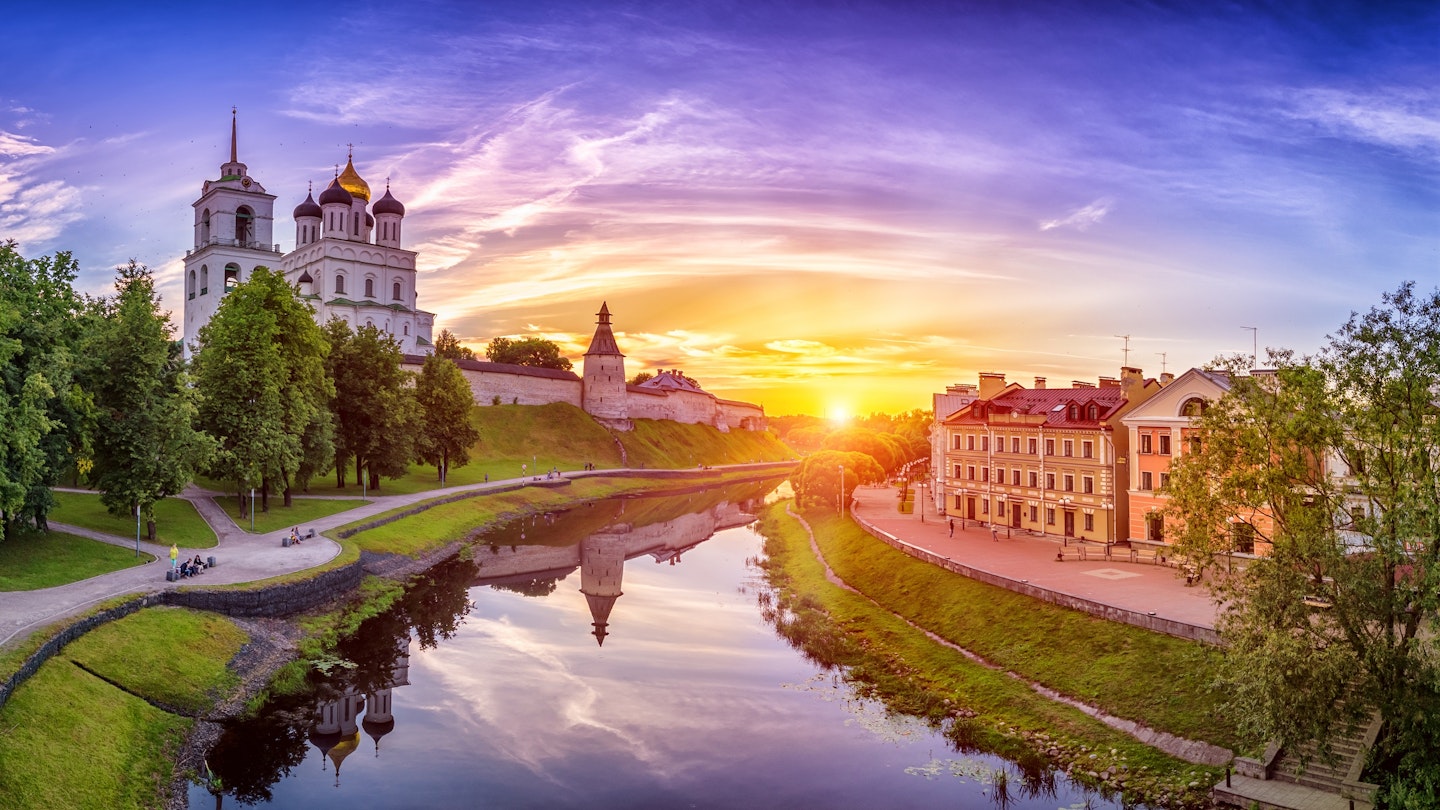Discover the Northwest Region of Russia: Petrozavodsk, Veliky Novgorod, and Pskov
Endearing yet slow, Russia’s old-school sleeper trains are gradually being replaced by a new generation of faster daytime trains, reminiscent of those utilized throughout Europe. Moreover, a gradual transformation of smaller cities and towns, long overlooked, creates opportunities for adventurous travelers to discover this captivating region in Russia. In particular, Russia’s northwest is now more accessible than ever, with new Lastochka trains connecting key tourist destinations. This triangular route begins in St Petersburg and links Petrozavodsk in Karelia with the ancient cities of Novgorod and Pskov to the south.
Petrozavodsk: Gateway to Karelia
As the capital of the Republic of Karelia, Petrozavodsk stands out as one of Russia’s prime outdoor destinations. It serves as a portal to the pristine glacial lakes bordering Finland, attracting numerous adventure enthusiasts throughout the summer months. Travelers can seek insights from local tour operators and guides, such as Nordic Travel or RussiaDiscovery NorthWest, regarding activities like rafting, trekking, and other exciting tours.
The main attraction in Petrozavodsk is the remarkable Transfiguration Church on Kizhi Island, reachable via hydrofoil from the banks of Lake Onega. This wooden marvel, boasting 30 domes and constructed entirely without nails, is a highlight of the Kizhi Museum Reserve, which showcases numerous examples of wooden architecture sourced from around Karelia during the Soviet era.
Understanding the rich culture of the Karelians, an ethnic group closely related to Finns, can be enlightening. To explore their heritage, visit the Museum of Regional Studies. For an authentic taste of local cuisine, don’t miss Karelskaya Gornitsa.
Accommodation Options in Petrozavodsk
Petrozavodsk is a charming city with a discernible Finnish influence, offering a range of accommodation choices. A popular option is Mini-Hotel Ilma, which also features hostel facilities.
Traveling to Petrozavodsk
Travelers can find two Lastochka trains operating daily between St Petersburg and Petrozavodsk, with the journey taking approximately five hours. Alternatively, conventional overnight trains complete the trip in about 7½ hours.
Exploring Veliky Novgorod
Known as the cradle of Russian statehood, Veliky Novgorod is Russia’s oldest city, laden with medieval architecture. Notable highlights include the Novgorod kremlin, a 14th-century fortress housing many of the city’s significant historical sites. Within the kremlin, the vast 19th-century 1000 Years of Russia Monument depicts important Russian figures including princes, tsars, and heroes. Additionally, the excellent Novgorod State United Museum and the ancient St Sophia Cathedral, Russia’s oldest church, are must-see attractions.
Accommodation in Veliky Novgorod
A stay in Novgorod is essential to fully explore its medieval treasures. Hotel Volkhov is a well-known tourist-friendly establishment situated in the city center. For a taste of traditional Russian cuisine, indulge at Dom Berga, a delightful spot located within a 19th-century merchant’s house. For a modern dining experience, consider visiting the uniquely designed Zavod Bar.
Traveling to Veliky Novgorod
Travelers heading to Pskov can catch a Lastochka train from Petrozavodsk, leaving just before 11 am and arriving at Veliky Novgorod around 5:30 pm. This same train continues onward to Pskov, reaching its final destination before 10 pm.
Discovering Pskov
Pskov, historically a junior and occasional rival to Novgorod in medieval times, boasts an impressive fortress, the Pskov kremlin, resembling a Viking ship at the confluence of the Velikaya and Pskova rivers. Among its many architectural treasures, the Cathedral of the Transfiguration of the Saviour within Mirozhsky Monastery features an array of remarkable 12th-century frescoes. These frescoes are regarded as the most intact representation of biblical narratives from before the Mongol invasion.
Pskov also serves as a convenient entry point into Russia from the EU, with two checkpoints on the nearby Estonian border within 60 km. One checkpoint is en route to the ancient town of Stary Izborsk and the renowned Pechory Monastery, known for its unique burial cave complex. The other leads to Riga, Latvia, passing briefly through Estonia.
Accommodation in Pskov
For fantastic views of the river and the kremlin, Hotel 903 ranks as one of the top accommodations in Pskov. Additionally, the upscale Rusakov restaurant offers stunning river views while serving delicious Russian cuisine and wines sourced from the Russian Black Sea coast.
The picturesque Pskov region, dotted with hills, lakes, and rivers, is experiencing a subtle resurgence as an attractive domestic tourism destination. New hotels and lodges are emerging, many clustered around Mikhailovskoe, the estate of Alexander Pushkin, one of Russia’s most celebrated poets. A commendable country-style hotel called Arina R. can be found nearby.
Traveling to Pskov
For those wishing to travel to Pskov, a total of four Lastochka trains operate daily, providing convenient connectivity to St Petersburg, with the journey lasting approximately 3½ hours.
The Lastochka Trains: A Modern Travel Option
Designed by Siemens, Lastochka trains are domestically produced and modeled after the trains found at Heathrow Airport in London and other countries like Germany and Israel. While the interior may be minimalistic, these trains represent a significant advancement in making Russian travel both quicker and more comfortable. For schedules and tickets, travelers can visit the official Russian Railways website, or download the Rail Russia app to facilitate their travel planning.
